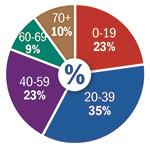Lancaster has long been known for its involvement in the War of the Roses. Following its victory over Richard of York, the House of Lancaster went on to rule England for more than a century. Today, the remnants of that past are dotted throughout the town, which is home to a number of opticians.
Paul Hutchence, practice owner and optometrist at Welbourne Opticians, says ‘Lancaster is a lovely place to live, with lots of cultural events and outdoor activities. The Lake District is only half an hour’s drive away and the two universities mean there are lots of things to do for young people’.
Welbourne Opticians has been in town since the 1930s, passing through a number of owners until Hutchence and his DO partner Carl Farrington took it over in 1993.
Hutchence says things have gone really well for the pair, even during a time when some multiples have struggled to succeed in the town. They celebrated their 25th anniversary as the owners of Welbourne last month.

The practice has one consulting room, a retinal camera, a visual field screener and on-site glazing facilities. Hutchence (pictured) says his main concern is ‘doing my best to provide a good and efficient service to our patients’.
Welbourne caters to a ‘varied patient group’, he says. ‘We saw a refugee who was new to the town last week and have had university vice-chancellors, academics and lots of students come to us.’
Keith Coxhill, of Moon & Coxhill Opticians, has been working in the town since the 1980s. His practice has occupied a number of locations in the Morecambe and Lancaster area but is now situated directly between both town centres.
‘The move was an opportunity to develop the practice on the outskirts of the town and thus attract a different market,’ says Coxhill. ‘People like continuity and we try to offer our patients a great level of care and attention.’
Coxhill’s practice has one testing room and a glazing laboratory. There has been a ‘swing away from metal in recent years’, he says. ‘There’s been a consistent move towards acetate and darker frames.’
Coxhill says he cannot match the budgets of the multiples – hence one reason for the move and change in target audience. But he is positive about the level of care his practice provides.
Who’s in town
Total: 6
Independents: 3
Multiples: 3
Average costs
The price of an eye exam in Lancaster ranges from £25 to £35, at an average cost of £29.

Population - see pie chart
Population: 69,487
Community eye care
According to the Locsu Atlas Map of Optical Variation, North & West Lancashire Local Optical Committee has a contract with Blackpool CCG and West Lancashire CCG in Cataract Referral and OHT Monitoring.
Health and affluence
- The average house price in Lancaster is £200,130 (Zoopla), compared with a UK average of £223,257 (Land Registry, 2017)
- Lancaster has an average salary of £21,028, with the UK average being £27,271 (Payscale, 2018).
- In Lancashire, it is estimated that 53,150 people are at risk of or living with sight loss due to the early stages of AMD (RNIB Sight Loss Data Tool).
- By 2030, it is expected that there will be 53,860 people living with sight loss in Lancashire – an increase of 34.9% (RNIB)
Fact file

Lancaster Castle, built more than 1,000 years ago, was a prison for hundreds of years. No place in England, apart from London, saw more hangings than Lancaster, earning it the nickname ‘the hanging town’.
Lancaster Canal has the longest stretch of man-made waterway without a lock in the country. During its construction, engineers followed the land’s natural topography, allowing for 41 miles of continuous canal.
George Fox, pictured, founder of the Quaker movement, is said to have had a vision on Pendle Hill prior to establishing the movement. He was also imprisoned at Lancaster Castle twice in the 1660s.
Would you like to work in Lancaster? Go to Optician Jobs to find out about all the latest opportunities available
